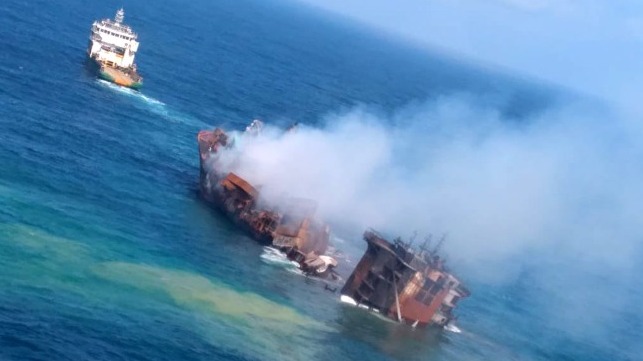The Maritime Executive
Shanghai Salvage, a division of the Chinese Ministry of Transport, has been awarded the contract to remove the wreckage of the sunken container ship Pearl X-Press waters off the coast of Sri Lanka, according to local media. Florida-based lifeguard Resolve Marine will also take part in the scope of work, Sri Lanka’s Daily Mirror reports.
“The cleaning of the ship’s materials will be carried out by the Resolve Marine Company in one stage and the cleaning of the wreckage of the ship will be carried out by the Shanghai Salvage Company in the other stage. They will be paid by the insurance company that provided the insurance cover to the Pearl X-Press ship,” Sri Lankan Justice Minister Ali Sabry told the country’s parliament last week.
The Shanghai Salvage Bureau of the Ministry of Transport, also known as the Shanghai Salvage Company, has become a major player in commercial salvage in the Indo-Pacific. It was recently renamed China Ocean Engineering Shanghai Company, or COES, but it says it still has a mission to build China’s “sea power” and promote the development of the “Belt and Road”.
Some commercial salvagers view the bureau’s participation in wreck removal tenders as a worrying development, as it is a government entity and can draw on Chinese state resources when submitting a bid. offer. “It’s like the US Coast Guard is going out and bidding on salvage contracts,” one lifeguard told TME in a recent interview.
Compensation negotiations
The government of Sri Lanka is still in dialogue with the owner and the insurer of the Pearl X-Press reach an agreement on environmental compensation. The ship dumped tons of plastic nurdles (raw plastic pellets) as it sank, and drifts of hard-to-remove material landed on beaches on the island’s west coast. Plastic pellets pose a hazard to wildlife if ingested and their size makes them difficult to clean. To date, around 650 tonnes of pellets have been removed from Sri Lanka’s beaches, thanks to 3,500 man-days of effort, Minister Sabry said.
An environmental damage assessment for the effects of the sinking is still underway, with foreign assistance, and Minister Sabry said it would be completed by early January at the latest. At that time, he said the government would file an additional claim for environmental compensation with the shipowner.
An initial payment of $3.6 million has already been received to help pay for the economic impacts, and $1.6 million of this amount has been distributed to fishing communities that have been directly affected by the pollution caused by the ship.
If the Sri Lankan government fails to reach an agreement with the shipowner for environmental damage, Minister Sabry said, his office is ready to take legal action.

